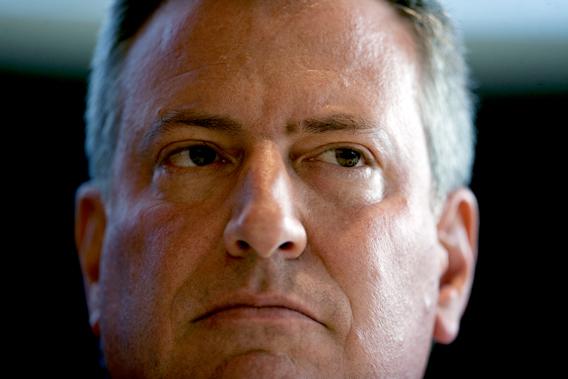For progressive intellectuals, Bill de Blasio’s campaign for mayor of New York City is electrifying in a way that’s almost reminiscent of the early days of Barack Obama’s first presidential run. New York City, in so many ways the heart of left-wing America, has become a bit of a political embarrassment. Its longtime mayor, Michael Bloomberg, is in fact a progressive leader on many crucial social and public-health policy issues. But at a time of rocketing concern about inequality, he’s a poster child for the noxious mix of financial and political power, sitting atop an urban wealth pyramid specifically associated with the financial industry that many blame for the 2008 crisis and the grindingly slow labor-market recovery of the past several years.
In de Blasio and his speeches decrying the “tale of two cities” that New York has become, the angst about inequality has found a voice.
Encomiums are pouring fourth not just from the usual gaggle of metro beat columnists and urban union leaders. Columbia University economist Jeffrey Sachs is excited. George Packer at The New Yorker is thrilled that he’s going “to make New Yorkers think” about inequality “not as an unpleasant fact of metropolitan life, but as an immense problem that must be addressed.” Talking Points Memo editor Joshua Marshall thinks a de Blasio win “could be a pretty big moment for progressive politics nationwide.” National Journal’s Matthew Cooper says if his brand of populism can make it in New York, “other populists are sure to try and, to paraphrase Frank Sinatra, make it anywhere.”
It’s a nice hope, and de Blasio indeed has some good ideas. But everyone should take a deep breath or two. Economic inequality is a serious issue and municipal governance is a serious matter, but the fact is that the two have relatively little to do with each other. All New York City mayoral elections attract disproportionate media attention because so much of the national media is based there. That’s something those of us who live in the rest of the country have learned to deal with. But this disproportionate attention tends not to be paired with any specific focus on what the mayor actually does—which is to say manage city agencies and local regulations within the rather narrow confines of existing state and federal law.
Curbing the most egregious abuses of Wall Street, in other words, isn’t part of the mayor’s job. Even curbing in the most trivial abuses of Wall Street isn’t part of the mayor’s job. The city can’t even really set its own tax policy. Even to the extent that it can tax bank impresarios, it can’t stop them from commuting from New Jersey. The fundamental problems of financial regulation, in other words, need national solutions.
Conversely, the stark inequalities existing in the city are in part a bit of statistical gerrymandering. If you ride the 6 train north from the financial district through the Upper East Side and across the river into the Bronx, you’ll naturally be struck by the immense gap in wealth and income visible along the route. That said, the fact that Manhattan and the Bronx are part of a single amalgamated city is a bit of a historical quirk. Had Greater New York never been assembled, the Bronx as an independent city would not be a particularly inegalitarian place, it would simply be a poor one, situated across a narrow river from a much richer one. Conversely, if you visit America’s numerous prosperous suburban towns you’ll find a low level of inequality not because of progressive policy triumphs, but because exclusionary zoning is keeping the poor out.
Which is to say that on some level the stark inequality of New York City is a municipal success story. New York is a place that lots of very rich people want to live in (unlike, say, Newark), but it’s also a place that hasn’t locked the poor out of housing and transportation services (unlike, say, Bergen County).
There are lots of things New York and other high-demand cities could do to improve the lives of the nonwealthy, starting with the construction of more plentiful housing and continued efforts to improve the quality of local schools. But realistically these things aren’t going to make a dent in local inequality. If anything, more affordable housing will make your city’s inequality statistics look worse by importing more people of modest means rather than pushing them into Jersey City. Conversely, even under the most utopian scenarios, de Blasio’s signature proposals around universal preschool couldn’t possibly move the inequality needle for decades, not until today’s infants join the city workforce.
Mostly mayors have to deal with a lot of boring stuff: the workaday business of trying to deliver cost-effective public services. Fiorella LaGuardia famously said that there’s no Democratic and no Republican way to pick up the garbage. That was smart politics from a Republican running in a heavily Democratic city, but it’s also more or less true. At a minimum, better local government services aren’t going to spark a nationwide political revolution. They’re also not going to cut the princes of Wall Street down to size. Tackling big national issues requires national political mobilization. The real embarrassment of progressive New York is that for 20 years the local Democratic Party hasn’t managed to persuade a heavily Democratic city that its officials can pick up the garbage. Proving them wrong by electing a mayor who does a great job of that would be a sign of something. But raising unrealistic expectations that city government can tackle fundamental questions of social justice is at best a recipe for disappointment.
